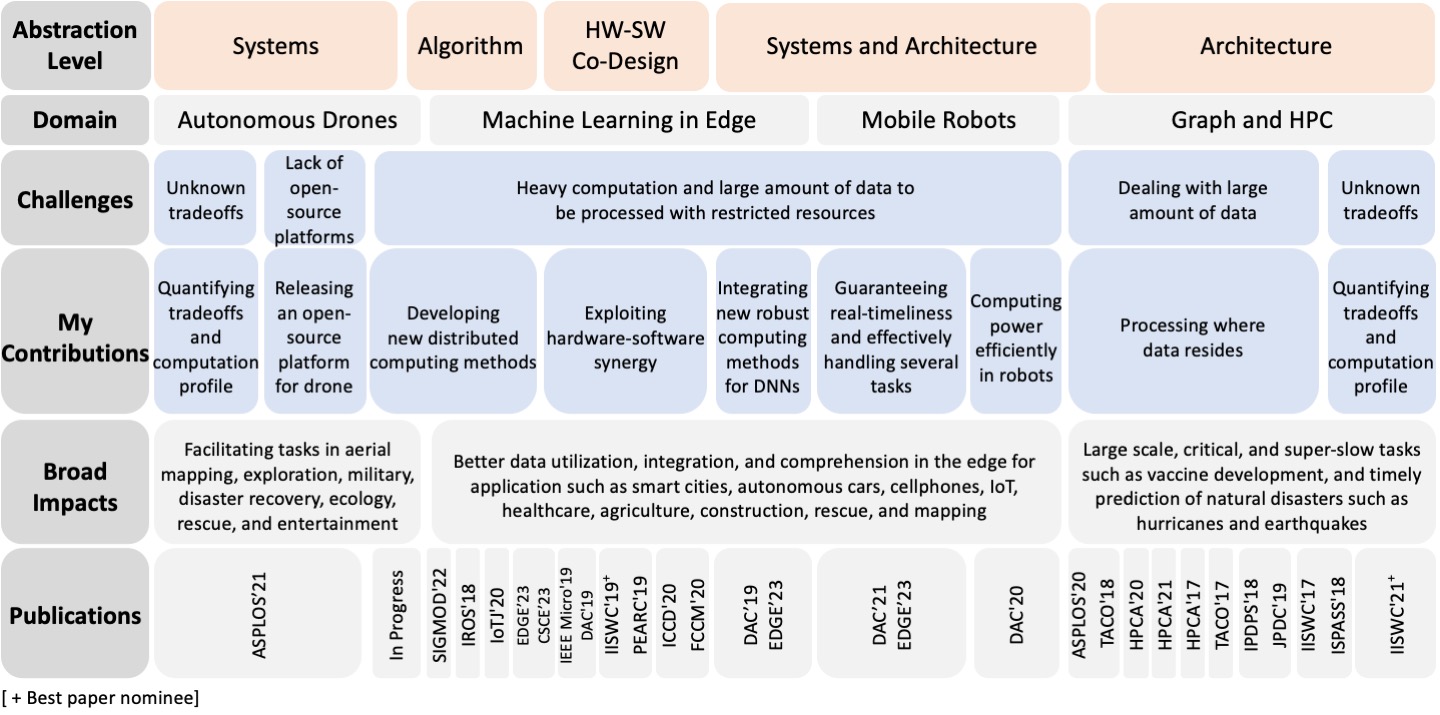Invited Talks
ReLAMP @ MICRO’25, Efficient Microarchitectures for Resilient Large Model Processing Workshop in conjunction with MICRO 2025,
“From KV Caches to Tensor Cores: Practical Unstructured Sparsity for LLM Inference.” Seoul, South Korea, October 2025.DOSSA-6 @ ISCA’24, Sixth International Workshop on Domain Specific System Architecture in conjunction with ISCA 2024,
“On-Device Computing: Rain AI’s Mission for Energy-Efficient AI Hardware.” Buenos Aires, Argentina, June 2024.UCI IAP Workshop, UC Irvine Industry-Academia Partnership Workshop,
“On-Device Computing: Rain AI’s Mission for Energy-Efficient AI Hardware.” Irvine, CA, May 2024. [video]AMD, AMD Tech Talk,
“Harnessing the Power of Edge Systems in a Data-Driven World.” February 2024.DARPA ERI 2.0 Summit, Novel Architectures for Neuro-Symbolic Computation Workshop,
“Towards Intelligent Edge Devices.” Seattle, WA, August 2023.University of Illinois Urbana-Champaign, Department of Computer Science,
“Harnessing the Power of Edge Systems in a Data-Driven World.” Urbana, IL, May 2023.Johns Hopkins University, Whiting School of Engineering,
“Dealing with Data Deluge in Edge Systems.” Baltimore, MD, March 2022.Princeton University, Department of Electrical and Computer Engineering,
“Dealing with Data Deluge in Edge Systems.” Princeton, NJ, March 2022.University of Southern California (USC), Department of Electrical and Computer Engineering,
“Dealing with Data Deluge in Edge Systems.” Los Angeles, CA, February 2022.Pennsylvania State University, Department of Electrical Engineering and Computer Science,
“How to Deal with Heavy Computations in the Edge?” University Park, PA, February 2021.Georgia Institute of Technology, Department of Computer Science,
“How to Deal with Heavy Computations in the Edge?” Atlanta, GA, February 2021.
Academic Research
During my PhD studies, my research primarily focused on the field of computer science, with a particular emphasis on managing data in edge systems. I strived to establish guidelines that navigate the trade-offs between hardware and software for the next generation of these systems. To effectively address the unique constraints presented by edge systems, my work involved the development of innovative machine learning techniques and the exploitation of hardware-software synergy.
 [Overview of my PhD Research] [Last updated Jan. 2024]
[Overview of my PhD Research] [Last updated Jan. 2024]
Teaching
My teaching journey began in high school, where seniors passed on knowledge for the astronomy Olympiad, covering integrals, advanced calculus, differential equations, astrophysics, cosmology, thermodynamics, and much of the undergraduate physics curriculum.
During my undergraduate studies in electrical engineering, I served as TA for 12 courses, mainly in computer architecture. In my senior year, I managed the Microprocessor Systems Laboratory at Sharif, the only resource available to undergraduates for Altera and Xilinx FPGA boards, MCUs, and processors faster than 8051.
While pursuing my PhD at Georgia Tech, I served as TA for 3 courses and as primary instructor for 2 consecutive summers for an advanced senior-level course in computer architecture. The websites for these courses are listed below.
- Summer 2020: Instructor, Georgia Tech, CS4290 Advanced Computer Organization
- Summer 2019: Instructor, Georgia Tech, CS4290 Advanced Computer Organization
Undergraduate Research
I enjoyed working closely with more then 40 of our talented undergraduate students during my PhD. Together, we achieved significant milestones and our collaborative efforts resulted in several publications. You can find the main website here, HPArch Undergraduate Research, although please note that it is no longer actively maintained. Feel free to explore the exciting final demos from our one or two semesters of hard work: [SysML’19] [FPL’19] [Summer’19] [Spring’20-1] [Spring’20-2]
Service
Organization Committee
- Spice’25@MICRO, Co-Chair
Session Chair
- MICRO 2025, Session Systems for AI (LLMs)
- MICRO 2024, Session GPU Synchronization/Concurrency
Program Committees
- MICRO 2026, Program Committee
- ISCA 2026, Program Committee
- HPCA 2026, Program Committee
- MICRO 2025, Program Committee
- ISCA 2025, Industry Track Program Committee
- HPCA 2025, Program Committee
- ICCD 2024, Program Committee
- MICRO 2024, External Review Committee
- ISCA 2024, Industry Track Program Committee
- DAC 2024, Program Committee
- HPCA 2024, Program Committee
- DeLTA 2024, Program Committee
- ISCA 2023, Program Committee
- MICRO 2022, Artifact Evaluation
- ISCA 2022, External Review Committee
- ASPLOS 2022, External Review Committee
- Georgia Tech ArchiTECH 2016, Organization Committee
Journal Reviewer
- IEEE Transactions on Cloud Computing
- IEEE Transactions on Parallel and Distributed Systems
- IEEE Transactions on Mobile Computing
- IEEE Internet of Things Journal
- Springer Journal of Supercomputing
- IEEE Transactions on Services Computing
- IEEE Transactions on Computer-Aided Design of Integrated Circuits and Systems
- ACM Transactions on Architecture and Code Optimization
- IEEE/ACM Transactions on Networking
- IEEE Transactions on Vehicular Technology
- IEEE Journal on Emerging and Selected Topics in Circuits and Systems
- IEEE Access
- IEEE Micro
- IEEE Transactions on Computers
- Engineering Applications of Artificial Intelligence
Submission Co-Chair
Community
- Mentor, Portfolio Project, AI4ALL, 2024
- Student Volunteer, PACT’20 (IEEE/ACM), 2020
- Student Chaperone, PhD Visit Days (Georgia Tech), 2015
